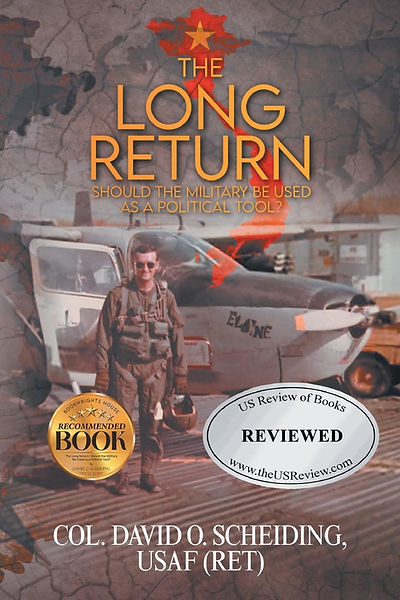David O. Scheiding
Biographies & Memoirs

Book Collection
The Long Return: Should the Military Be Used as a Political Tool?
Upon returning to the United States after serving in Vietnam, Col. David O. Scheiding, USAF (RET), and other Vietnam vets were met with a significant amount of antiwar, anti-military sentiments by the American Society toward them. David reveals his reaction to the significant change in the general American attitude toward the Vietnam War.
The Long Return shows us his experiences as an Air Force pilot and his efforts to understand the change in the American attitude by looking at history and how and why the use of the military developed into a political tool by use by politicians. This is the only way he has been able to adjust and accept the change and to finally be at peace with himself, completing his "long return" from Vietnam.
Available at
Testimonials
What Readers Are Saying
I received this book as a gift, and once I started reading it I couldn't put it down! The author perfectly captures the experience of being a Forward Air Controller (FAC) in Vietnam in the underpowered O-2A. I had the same job, and his description is spot-on. More important, he provides a (sadly) accurate description of the toxic environment we Vietnam vets encountered when we returned home. The title is right on: it was truly a long return, taking some 40 years to get our welcome home. I found the description of the author's duty as an accident investigator during the crash of the Vietnam baby-lift a very telling description of Air Force politics.
Definitely recommend!
George E. Nolly
Amazon Review
This is a short book written in plain, matter of fact style - noteworthy in itself because the text was published 44 years after the events in question. The author faced many harrowing challenges flying drangerous combat missions as an O-2 FAC during a period of intense combat in 1971-72. His impressive professionalism and dedication to duty shine through on every page, as does his humanity and empathy (his account of how he dealt with one of his pilots, who refused to fly missions our of religious beliefs, is very emotional but also very satisfying ultimately). At one stage during the 1972 Easter Offensive the author was working a 20-hour day both flying and running his squadron. Reading this chpater really brings home the genuinely inspiring dedication of some combat veterans, in any force.
The author ends his book with some reflections on politics and use of the armed forces since his own war experiences. This will not be to everyone's taste, as they reflect his political and religious views, but they are worth reading nonetheless for younger generations. He is also a little inaccurate on his observation that President Bill Clinton's use of militaryforce amounted to, "he did launch a couple of Tomahawk Cruise missiles at a warehouse on a weekend, but not much more." (page 141). This is an unfair conclusion on the man who, by unleashing very effective US Air Force and US Navy power, under Adminral Leighton Smith, during a 3-week period in 1995 brought the Bosnian War to an end - something the European Union ad conspicuously failed to do for the previous 3 years and which had culminated in the Serbian massacre at Srebrenica. Military action by the US armed forces in 1995 was decisive in ending Serbian aggression against Bosnia and Sarajevo.
But this is a minor point. The author commands everyone's respect for his dedication, bravery, professionalism, devotion to duty and conduct with honour. A truly impressive individual, who writes his memoir plainly but with a common humanity that will be heartwarmning to every reader.